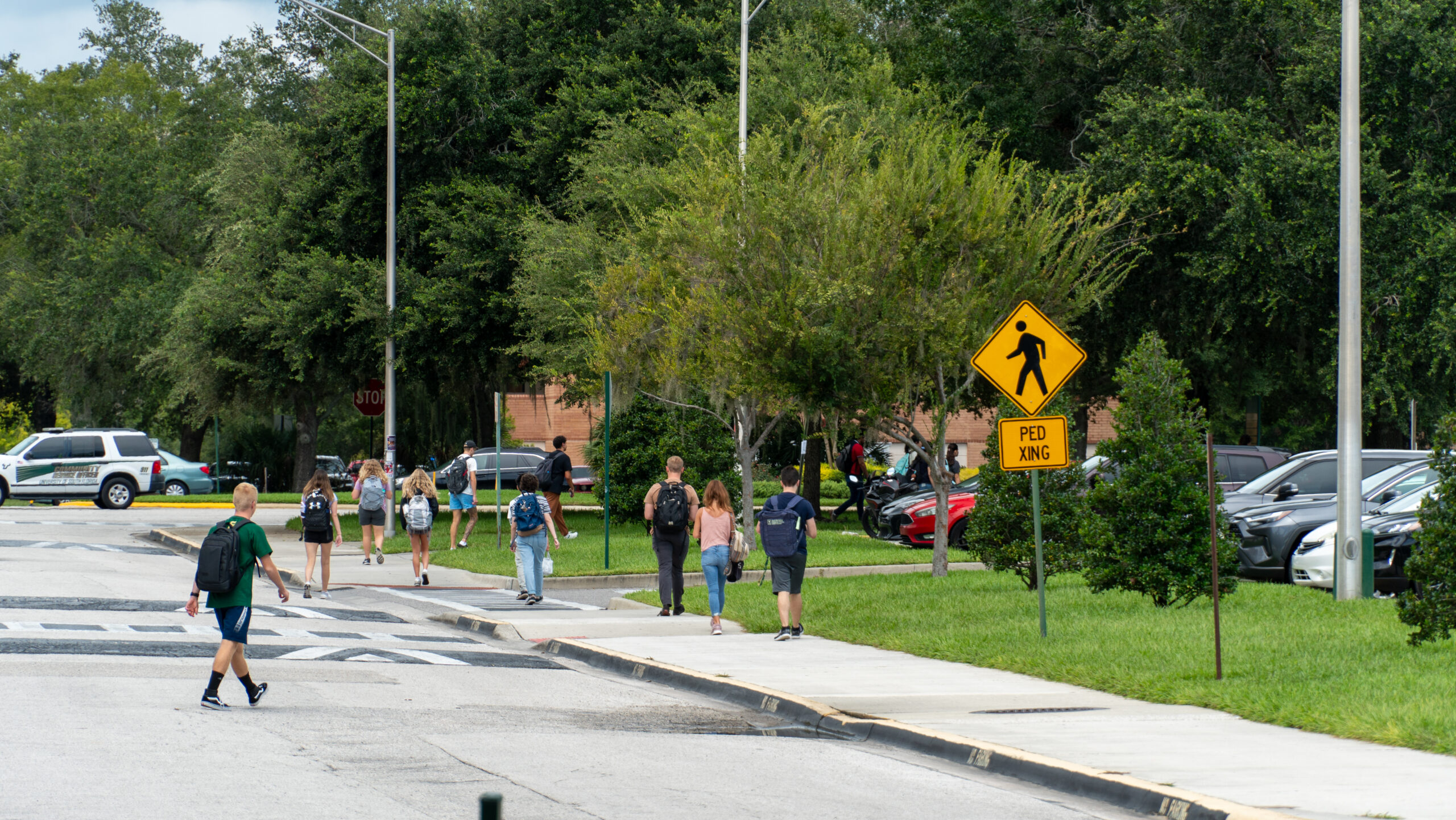
The absence of crossing guards on campus is causing some student drivers and pedestrians to worry about traffic safety.
Senior information science major Ryan Baltodano said the last time he saw crossing guards on campus was at the beginning of the fall semester.
Baltodano said the officers are beneficial to managing student traffic safely.
“Sometimes, when it comes to the right of way and students are late for class, they’ll disregard other people,” he said. “So having some order kind of makes it fair to everybody.”
The on-campus presence of the community service officers (CSOs) who facilitate the flow of traffic decreases after the first weeks of the semester, according to Michael Lavelle, University Police (UP) public information representative.
Lavelle said this happens because traffic patterns tend to lighten to an organic flow between pedestrians and vehicles as the semester continues.
There are 10 active CSOs working on campus, Lavelle said. UP works with CSOs that help traffic in pedestrian crossings when the “critical need” arises, according to Lavelle.
Though crossing guards used to be contracted with USF under a private company in the past, staffing issues led to the contract being terminated, according to Lavelle. This led to the role of CSOs being created.
During the first weeks of classes, CSOs are stationed at the crosswalks with the highest pedestrian traffic, according to Lavelle.
When not patrolling crosswalks, CSOs are tasked with identifying situations in which police assistance might be needed and helping with maintenance issues that require immediate attention, Lavelle said. CSOs are also deployed to turn items into lost and found and to assist with elevator malfunctions when needed, he said.
Crosswalks adjacent to the library, along Leroy Collins Blvd. and those on Genshaft Drive near the College of Business typically are locations where CSOs are placed, according to Lavelle.
Junior biomedical science major Peter Fisichella said that without CSOs managing crosswalks, students are sometimes put in more danger.
“I see a lot of people on both sides, whether it’s between student drivers, people walking or people on the scooters, just wanting to take their turn without disobeying any rules,” Fisichella said. “I’ve seen a lot of people get put in danger because of that”.
Lavelle said the high numbers of people commuting on campus daily on foot, bicycles, scooters, cars and skateboards gives many opportunities for conflicts to occur.
He said if an area seems concerning during a routine patrol, CSOs can be deployed to help.
Senior chemical engineering major Sophia Seidensticker said a lot of students don’t pay attention when walking. She said this makes drivers frustrated and potentially more reckless.
The presence of crossing guards on campus is a matter of timeliness and organization, but most importantly safety, according to Seidensticker.
“Having that sort of presence there to help direct [traffic] makes people pay attention,” she said.
Senior chemical engineering major Jonathan Guerrero said a close call with a driver made him realize how much the presence of CSOs shouldn’t be taken for granted.
“Sometimes the cars go a bit too fast. I was walking from the [Social Sciences building] and this car didn’t even slow down when I was walking,” Guerrero said. “It just kind of swerved around me.”
Students said CSOs are most needed near Leroy Collins Blvd., crosswalks near dining halls like the Juniper-Poplar Hall and the Leroy Collins garage.
Fisichella said he always has to make an effort to be cautious when crossing the street if students in scooters or cars are not paying attention.
A more constant presence of crossing guards on campus would help provide students with peace of mind while walking to class, according to Fisichella.
“It hasn’t been an issue in terms of getting to class, but there’s definitely more time taken up just because I’m trying to make sure I won’t get hit by a car. I’m just trying to do everything I can to be safe,” Fisichella said.
